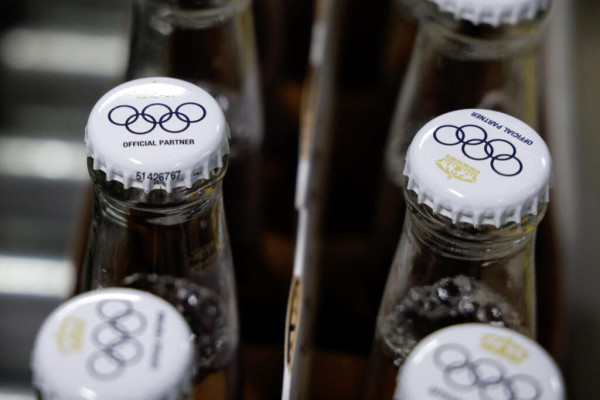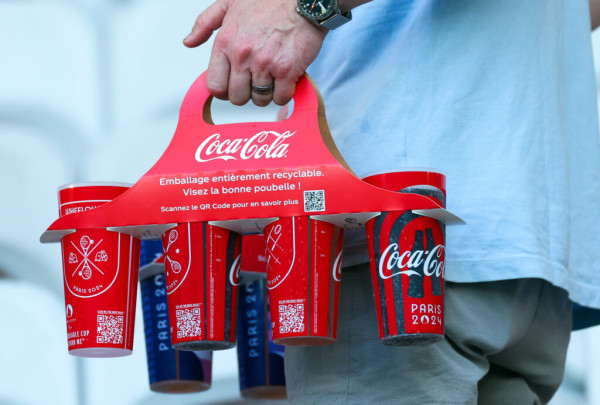Don’t bring a plastic bottle to the Olympics — unless you’re Coca-Cola
The French would call it deux poids, deux mesures — literally, “two weights, two scales” — or a double standard, for us anglophones.
At the Paris Olympic and Paralympic Games, you won’t be able to bring in plastic bottles. But Coca-Cola, which has exclusive rights to sell drinks at the games — well, they can sell you a drink from one.
The different treatment isn’t an attempt to make Coca-Cola more money, but rather to help slash the carbon footprint of the Olympic games.
The Paris planners have committed to halving the carbon output of the massive global get-together compared to the recent (nonpandemic) summer games in 2016 and 2012. And a significant part of that plan is replacing single-use plastic containers with reusable cups.
Yet while spectators will be held to that standard, Coca-Cola will be serving “more than half of the 18 million anticipated beverages” without single-use plastic, the company told POLITICO.
That leaves millions of drinks — roughly 6.4 million, according to a spokesperson for the Olympics organizing committee — as served from plastic bottles.
From Coca-Cola’s perspective, that’s the best it can do. Logistics simply prohibited the company from using fountains or returnable glass bottles everywhere, it said.
Yet to climate campaigners, it’s straight greenwashing: The Paris Games triumphantly tout a ban on single-use plastics, while its corporate sponsor quietly uses millions of them.
“It was a disappointment to us to hear that a lot of the beverages that are going to be poured into reusable cups at the games will be from single-use plastic bottles, and we want to see less of this happen in the future,” said Dana Miller, director for strategic initiatives for Europe at global marine protection group Oceana.
The logistics card
The Olympics plastics saga started last May when the city of Paris said spectators would be prevented from entering temporary competition sites with single-use bottles.
“The systematic use of recycled plastic bottles is replaced by a more virtuous consumption method, since recycling is not a solution for plastic pollution,” the Paris municipality’s website states.
Not specified: The fact that the plan doesn’t apply to the Games’ entire beverage operation.

Still, the site claims Coca-Cola “upgraded its range of beverages to meet the City of Paris’ goal of zero single-use plastic.”
This includes the use of 700 fountains across venues and at the athlete village, as well as returnable glass bottles and designated collection points, a Coca-Cola spokesperson told POLITICO.
Those efforts ran into a buzz saw last month when French media outlet Vakita revealed that the beverage giant would also be pouring millions more drinks from single-use recycled plastic bottles into reusable cups before serving them to spectators.
Coca-Cola insists it has no choice, given the logistical complexities of going plastic-free at some of the more nimble competition sites.
The firm is using recycled plastic bottles “where operational conditions prevent the installation of fountains or use of glass,” the company spokesperson said in a statement.
That includes venues not connected to the water distribution network, which prevents catering crews from handling glass bottles. One example is a temporary outdoor arena at the Versailles Palace. Another is a cycling track on Elancourt Hill on the outskirts of Paris.
The Olympics organizing committee also pointed out that plastic bottles would be used in venues “where it is not possible to install permanent Coca-Cola fountains because there is no long-term partnership agreement in place.”
And if it’s not the venue’s fault, then blame the sports.
Coca-Cola and the organizing committee both confirmed that sealed — and single-use — plastic bottles were necessary to meet the “desire expressed by some federations” to provide athletes with safe drinking options that limit the risks of doping by accident or sabotage.
The organizing committee also claims that its strategy includes “recycling 100% of the plastic bottles that could not be avoided for the public at certain sites.”
Repeat offender
It’s not the first time Coca-Cola has found itself in the line of fire for sponsoring major events and bragging about plastic-free merchandise while topping the plastic pollution charts.
Coca-Cola is consistently the world’s largest corporate plastic polluter, according to the annual brand audit report from green nongovernmental organization #BreakFreeFromPlastic, producing over 3.4 million metric tons of plastic packaging in 2022.

That same year, climate activists asked organizers of the United Nations climate conference in Egypt, or COP27, to strip the brand of its sponsorship role, claiming a plastic producer with ties to the fossil fuel industry should not be so present at the climate talks.
For Miller, the Oceana NGO director, the bottom line is that some reusable packaging is still better than none. “There is momentum growing at large events ... to use reusable packaging,” she said, adding that overall, the attempt at making reusable options work at large scale is a good thing.
Still, Oceana sent a letter earlier this month together with sports organizations and more than a hundred athletes urging Coca-Cola and its global rival PepsiCo to end plastic pollution “in the spirit of the Olympics and sport.”
“We want to see more of this, and we want to see it done better,” Miller added.